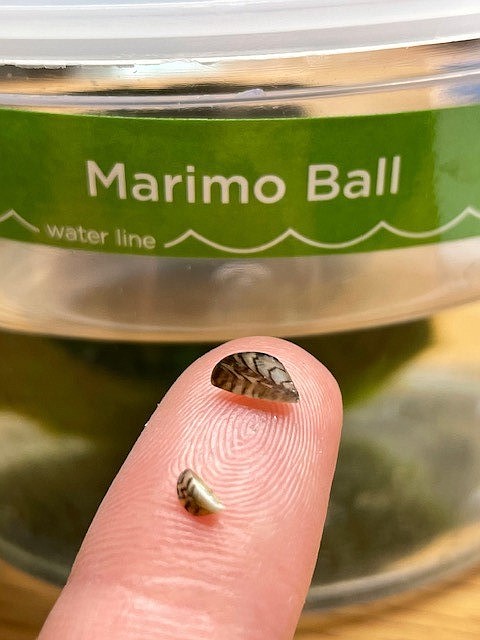'Betta Buddys' no friend to local waterways
Do you know what’s in your aquarium?
The Idaho State Department of Agriculture and other state agencies raised alarms this week when zebra mussels, an invasive species, were found on moss being sold in Idaho, Washington, Oregon, and Montana Petco and Petsmart locations.
Zebra mussels are a classic invasive species and one of the highest regarded invasive species in North America, said Nic Zurfluh, ISDA invasive species coordination, and outreach section manager. After finding them on the harmless-looking “Betta Buddy” Marimo Ball moss plant, ISDA asked Petco to remove the green fuzzy algae from store shelves.
Late Thursday, ISDA did not know how many “Betta Buddy” balls were sold in the Kootenai County area, in the state, or nationally. Nor do they know how long the product has been a part of Petco and Petsmart inventory.
“We do think we are on the leading edge of this. I don’t think it has been going on for years,” Zurfluh said. “It seems to be a new thing in the last couple of weeks.”
The product shipment originated from Ukraine and is a native freshwater mollusk native to Eurasia and the former Soviet Union. Since landing stateside, the moss balls have shifted hands through distributors and become a national concern, Zurfluh said, spanning from Alaska to Florida, California to Coeur d’Alene.
ISDA was first alerted to the issue Wednesday, with most of the action coming together within 24 hours, Zurfluh said. ISDA sent out investigative and regional specialists to ensure “Betta Buddy” products were off the sales floors.
"To aid in the investigation and prevent potential spread we immediately paused the sale of all Marimo aquarium moss balls at Petco locations and on petco.com and placed them in quarantine," a statement to The Press from Petco said.
The statement also said Petco is working closely with authorities, vendor partners and veterinary staff on appropriate next steps — including contacting customers and disposing affected products.
“Petco has been very cooperative and very understanding by sending out a communication to each store regarding the issue, picking up the product and making sure it is disposed of properly,” Zurfluh said.
Bivalve mollusks, zebra mussels attach to any hard surface — be it a dock, boat ramp, hydroelectric dam, or water system — through thistle threads and filter nutrients and energy, Zurfluh said. The mussels tend to establish themselves in lakes, rivers, canals, and water systems where they damage native species, water distribution systems, and mechanical systems.
While the mussels are not predatory, they are “filter feeders,” said Jamie Brunner with the Idaho Department of Environmental Quality. They could have a negative impact on Idaho’s ecology and economy.
“It takes the place of other native species in the food chain by feeding on the algae or plankton that would otherwise feed native species,” she said.
In an ISDA media release Thursday morning, the agency said the species could cost the state nearly $100 million annually in damage and lost revenue if it were to infest Idaho’s water bodies.
To Zurfluh’s and Brunner’s knowledge, this is the first time the state has encountered zebra mussels. There is no evidence any agency has eradicated the species once it's introduced to an ecosystem.
“So far, we’ve been successful at keeping invasive mussels out of waterways in Idaho, so this is a little concerning. It’s a lot concerning, actually,” Brunner said.
ISDA advised the public not to dump aquarium tank water or dispose of the moss balls in natural water bodies. They recommend:
• Putting the removed moss balls in a plastic bag and freezing them for at least 24 hours before throwing the bag in the trash.
• Boil moss balls in water for at least one full minute before disposing of them in the trash.
- Bleach / Vinegar - Submerge the moss ball in chlorine bleach or undiluted white vinegar for 20 minutes.
The moss ball should be disposed of in its packaging or sealed plastic bag. If vinegar, boiling water, or bleach was used the liquid can be disposed down a household drain - not down a storm drain where it could damage local waterways.
If the moss balls have already been in the aquarium, owners should clean the aquarium and dispose of the water in a sink or toilet. Aquarium owners should also carefully scrub the “tank, accessories, rocks, and decorations with a strong solution of chlorine bleach/water” or water that has been heated to 140 degrees.
ISDA recommends that owners conduct frequent water changes and monitor the tank for unusual aquatic growth.
ISDA Invasive Species Hotline: 877-336-8676 or info@isda.idaho.gov.
UPDATE
New recommendations from the ISDA specify additional disposal requirements:
"DO NOT dispose of moss balls in drains, waterways, or gardens. Moss balls must be destroyed and disposed of in a sealed container in the trash.
DESTROY moss balls by freezing, boiling, or by submersing in chlorine bleach or undiluted white vinegar.
DISPOSE of moss balls and any packaging in a sealed plastic bag in the trash. If vinegar, boiling water, or bleach was used, the liquid can be disposed of down a household drain but never down a storm drain where it could enter and damage local waterways.
DRAIN and clean the aquarium using either a hot water or disinfection method, keeping manufacturer recommendations in mind. "



